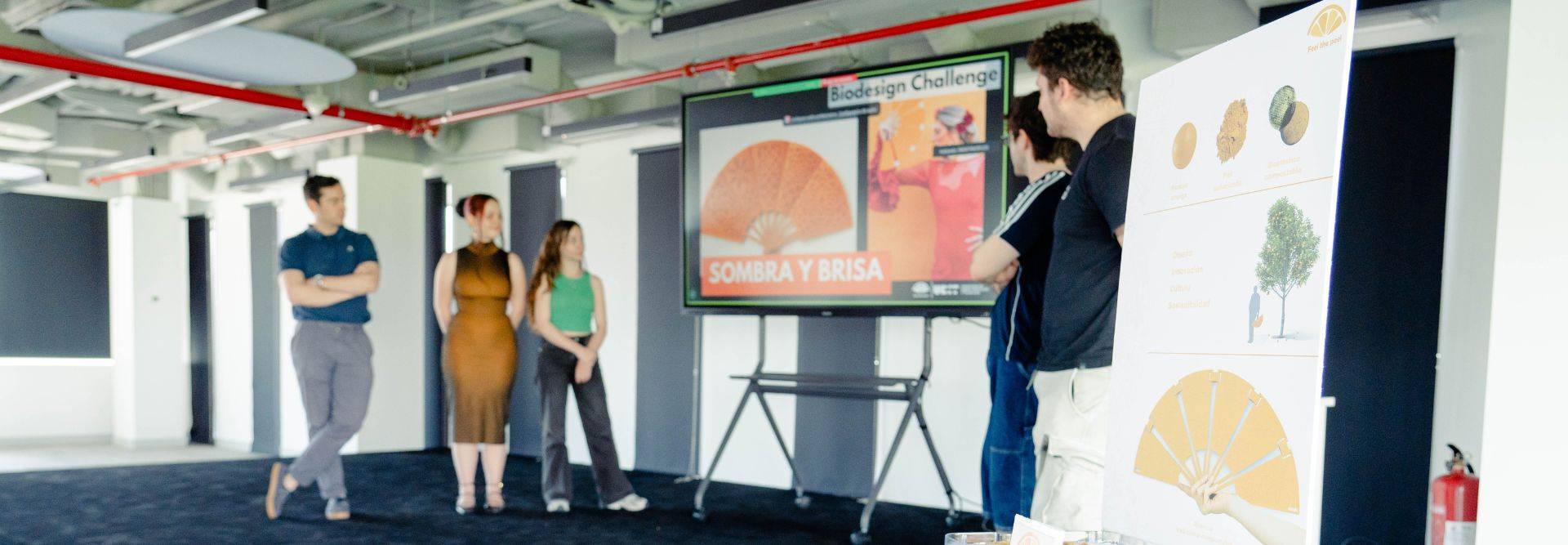A team formed by Pablo Pesqueira, Javier Villasevil, Marta Poy, Aaron Truzman, Carmen Carranza and Diego Rodríguez, students of the Degree in Product Design at UDIT, University of Design, Innovation and Technology, will participate in the final of the Biodesign Challenge (BDC), an international competition that connects art, design and biotechnology and whose main objective is to integrate emerging technologies in a creative and sustainable way.
The winning team of the semi-final held on 26 May at the Innovation Hub of the University's Campus of Technology, Innovation and Applied Sciences, started from a reality that is as everyday as it is ignored: Seville's bitter oranges, which adorn thousands of streets, today represent a social and environmental problem. As they are not suitable for direct consumption due to their bitter taste, a large part of these fruits end up falling to the ground, causing health problems and waste. Despite this, these trees form part of the collective imagination and of the city's landscape. In this sense, their project proposes transforming oranges into a biodegradable polymer for the manufacture of traditional fans, thus returning this wasted resource to the citizens as a symbol of sustainability, local design and cultural belonging.
It was not an easy decision for the jury to make, as it competed with other equally innovative projects, all of them developed by students of the Degree in Product Design at UDIT. Among them were the design of a modular office furniture system made from mandarin bioplastic, which absorbs pollutants and regulates the humidity of the air inside (Carme Basile, Rita Laura Pereda, Marina Seller, Tania Carranza, Teresa González, Inés Javier); a seed dispersal system that takes advantage of livestock transhumance to regenerate degraded ecosystems (Jaime López, Alfonso Padilla); and Waste Atlas, a digital and collaborative platform that revalorises waste as useful and sustainable materials (Lola Marín, Marta López).
The final will take place at the Parsons School of Design and the Museum of Modern Art (MoMA) in New York on 12 and 13 June, where all the finalists will have the opportunity to present their ideas to more than 40 judges from industry, academia and the arts. The winning team will receive the Glass Microbe, a trophy attesting to the quality of their project, which is passed on from one winning team to the next in each edition.
In addition to a global competition, the Biodesign Challenge is a training programme that supports the teaching staff of the institutions that decide to join this initiative, with pedagogical resources, advice and access to experts. In many cases, BDC members also commit to continue to support the most interesting projects from each edition, especially if they end up developing into startups, or into works of art that can be exhibited in museums or galleries. So far, the alumni who have taken part in this competition have managed to raise more than 30 million dollars in investment for their projects and have managed to patent many of them.
Other initiatives promoted by the organisation include the Biodesign Sprint, a month-long programme in collaboration with companies interested in exploring how biotechnology can provide answers to industry issues, and the setting up of regional Biodesign Hubs that function as interdisciplinary networks in different countries in Europe and America.
The competition, which was first launched in 2015 with a participation of 9 American universities, has evolved into a global event, with students from 64 high school and university classrooms around the world now participating. Over the past six years, teams from more than 100 schools from 30 different countries have participated in the competition.

